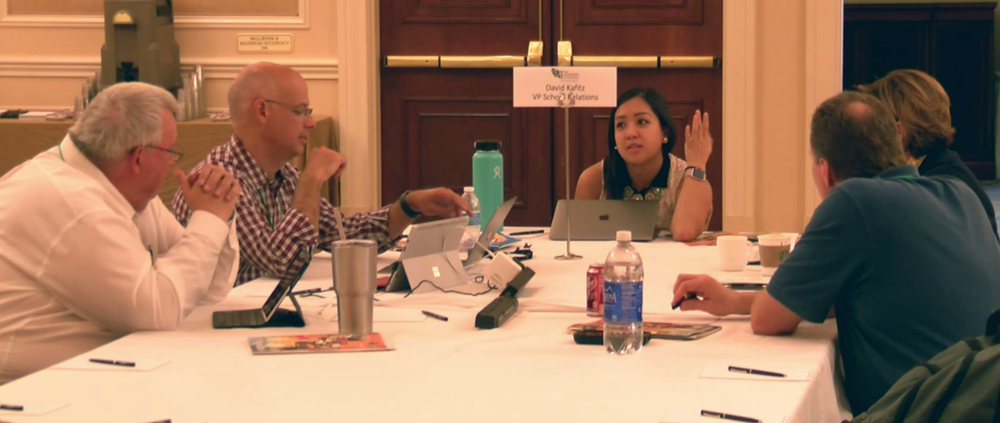During The Gathering, an annual event hosted by the Learning Counsel, education professionals met to discuss the events of the past year and to work together to envision the future. During this event, Learning Groups formed on KnowStory met in-person to take a closer look at how specific topics of interest are developing in regards to digital curriculum.
Learning Gaming Group
Learning gaming is an exciting and rapidly evolving area of digital curriculum. Its potential is exponential as learning games can be developed to be exceptionally immersive and interactive. By pairing learning with gaming, the content is augmented which can offer incentive to the learners. While these potentialities exist, there are many questions regarding the implications and appropriate applications of learning games in a curriculum.
Hosted by Group Chairmen Dr. Jasna Aliefendic, Technology Applications Coordinator, Garland School District and Suzi Wilczynski, CEO, Dig-It Games
In-attendance contributing members of the group included:
- Lana Nguyen – Poway Unified School District
- William Ooms – Diocese of San Bernardino
- Brent Benedict – Las Vegas Junior Academy
Those present for the meeting kicked off the discussion about Educational Gaming under the guiding question of “How do we help improve student learning through gaming?” Members acknowledged that there are public perceptions of “gaming” to overcome, specifically the violence in gaming prevalent in the consumer marketspace. With guidance, though, the gaming industry could be encouraged to leverage the enthusiasm and the learning value of gaming by young persons in the education world. It is widely acknowledged that in post-secondary and adult education and training of all types, gaming is a common pedagogical methodology deployed.
Video games aren’t usually the first thing that comes to mind when thinking about developing curriculum. In the past, video games often get grouped into the category of play-time and given no more serious consideration. Currently however, video games that are created specifically to facilitate learning are flourishing.
Digital learning games have been utilized effectively since the 1980’s. Games such as the “Munchers” series of math and grammar learning applications were widely utilized in the 1980’s and 1990’s. During the same period the learning game “The Oregon Trail” sold over 65 million copies.1 While the Munchers game series clearly assisted in students learning of grammar and math skills, The Oregon Trail eventually received criticism regarding its narrow scope and unrealistic depiction of the era. The success of the Munchers series and critique of The Oregon Trail allude to a central question teachers and administrators must ask themselves when considering implementation of a learning game; “Does this game contribute to the efficacy of student learning?”
It has been found that 74% of K-8 teachers are utilizing video games in the classrooms.2 With the growing availability of learning gaming apps we can expect to see even more widespread utilization in the future.
When considering which game may be beneficial for a subject it is best to start with learning goals in mind. After these goals are established then it is possible to search for a learning game that most efficiently and effectively helps students to achieve these objectives.
As a primer, here are overviews of a few potential learning games, looking at them through the lens of learning goals:
- Social Studies Goal: Learning about ancient Egyptian culture. Potential learning game solution: “Excavate! Egypt” by Dig-it Games. In this game students play the role of an excavator in Egypt, looking for relics that will teach them about the history of ancient Egypt. Students collect artifacts and analyze them to learn about the way of life of ancient Egyptians.
- Life Science Goal: Learning about ecosystems. Potential learning game solution: “Tyto Ecology” by Immersed Games. Students learn about what it takes for an ecosystem to be sustainable by adjusting which plants, animals, and environmental factors are at play. For more information about Tyto Ecology check out our App of the Week article about them.
- Mathematics Goal: Learning about decimals and integers. Potential learning game solution: “Gate” by Math Snacks. This game has students progress through 16 levels on a quest to save their world by utilizing numbers and place value.
The research being undertaken by Suzi Wilczynski, CEO of Dig-It Games was shared with the Gaming Learning Group. Suzi has been awarded a grant from the National Science Foundation to begin the work determining what data from game play can show learning. This is the first grant of its kind to a gaming company. This news stimulated a discussion of the potential for gaming in the classroom, but the consensus of the group was that there is still much to learn and do. The objectives to accomplish outlined by the group include:
- Curriculum impact of learning games is necessary
- Need for standards that include:
- Inquiry
- Promotes logical thinking
- Progressive problem solving
- Real time nature of the feedback of gaming
- Timeliness of game play data
- Game control becoming more sophisticated as the game progresses
- Reporting system that
- Gives types of feedback
- Report on standards of subject/learning
- Gaming system that advances over time and is a long-term play environment
- Functional needs of games vs. detailed needs
- Shared experience of gaming
- Cross-curricular gaming vs. isolated topic gaming
- What is the “bridge” between isolated topic games (ex. Math games) and open-ended simulation type gaming
- Exploration-based learning games
- Learning curve of gaming interface can have an impact on gameplay
- What are the tools gamers will use to deliver the learning and the learning feedback?
- Being able to do things in a different time/location
- Inventory of existing games and how they align to learning standards
The Learning Gaming group discussion delved into many of these subjects while at The Gathering. The conversation continues to develop on KnowStory. If you would like to learn more or join the discussion visit KnowStory, create a profile, and join any of the Learning Groups you are interested in!
Existing members in this Group in KnowStory include:
Clay Stidham Jr. – Blue Ridge Unified School District
Ben Fobert – Mountain House High School
Scott Holcomb – Shelby County Schools
Joanne Najarian – Andover Public Schools
Dewayne McClary – Fidelity Educational Consulting
David Henson – Grand Prairie ISD
Kelly Hunkins – Amador County USD
Jim Peterson – District 87
Josh Hirsch – Mapleton Public Schools
Lana Nguyen – Poway USD
Andrea Pritchett – Rockdale County Public Schools
Tracy Cindric – Ohio DOE
- Wagner, T. (May 08, 2017). What did Oregon Trail teach us? Marketplace. Retrieved from https://www.marketplace.org/2017/05/05/tech/make-me-smart-kai-and-molly/blog-what-did-oregon-trail-teach-us
- Takeuchi, L., & Vaala, S. (2014). Level up learning: A national survey on teaching with digital games. Joan Ganz Cooney Center. Retrieved from http://www.joanganzcooneycenter.org/wp-content/uploads/2014/10/jgcc_leveluplearning_final.pdf











